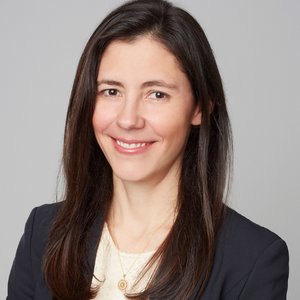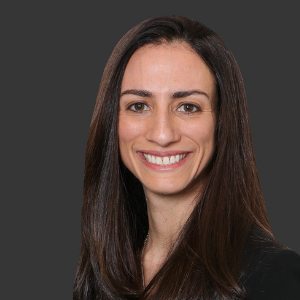Mary Inman: Partner and Head of International Whistleblower Practice, Constantine Cannon LLP
 “It shows you how powerful a single voice is in this world,” says Mary Inman, who specializes in representing whistleblowers under the U.S. and Canadian whistleblower reward programs. “I think that’s our love as humans for the David versus Goliath story. We still want David to prevail, or at least be heard.”
“It shows you how powerful a single voice is in this world,” says Mary Inman, who specializes in representing whistleblowers under the U.S. and Canadian whistleblower reward programs. “I think that’s our love as humans for the David versus Goliath story. We still want David to prevail, or at least be heard.”
With an innate penchant for fairness and justice from childhood, Inman says her family could have predicted she’d become a lawyer.
She entered law with the “amorphous notion” of wanting to do good in the world and affect positive social change. What was not clear, even coming out of law school, was what kind of lawyer she would be.
An Unexpected Expertise
After a couple of years clerking for federal judges in Maine and New Hampshire and one year inside Big Law at a large commercial law firm, a headhunter extended her a novel opportunity—join the new San Francisco office of a boutique firm specializing in representing whistleblowers.
Inman went from a passing familiarity with the subject matter to spending 17 years honing her craft with Phillips & Cohen, before joining Constantine Cannon in 2015, now splitting her time between its San Francisco and London offices.
“At the beginning of my career, there were only a handful of whistleblower reward laws. I’ve been incredibly fortunate to have chosen a field that has grown exponentially. The success of the whistleblower tool in aiding law enforcement efforts has spawned more and more whistleblower reward programs,” revels Inman. “My practice allows me to aid individual whistleblower clients, while at the same time helping them expose industry-wide frauds—so it’s the best of both worlds.”
With 24 years of specialization, Inman is an author, regular speaker and recognized expert in the area of U.S. and international whistleblower reward laws, with their focus on frauds in financial services, healthcare, automotive safety and government procurement as well as tax evasion, bribery of government officials and money laundering.
Encouraging Whistleblowers to Speak Out
Though whistleblowers are often ostracized, Inman asserts they play a critical role in maintaining the healthy ecosystem of an organization.
“Companies have an autoimmune response to whistleblowers, seeking to expel them from their system,” notes Inman. “However, research confirms my anecdotal experience that they’re actually the good bacteria that keeps a company healthy. Because they have the temerity to speak up and alert you to problems before they metastasize into a public relations nightmare, whistleblowers should be viewed by companies for what they really are — forward indicators of risk and an invaluable part of a company’s risk management system.”
She compares it to interpersonal relationships: “Only someone close to you, who really cares about you, will tell you the hard truths.”
Most countries’ laws focus on the employment law aspects of whistleblowing — whistleblower protection from retaliation and reprisal after they have spoken up, allowing whistleblowers to challenge unlawful retaliatory dismissal, demotion or blacklisting.
U.S. and Canadian law differs in that it also connects whistleblowers with the law enforcement and regulatory agencies who can act on their information and redress the harm. Agencies like the Securities and Exchange Commission (SEC), Ontario Securities Commission (OSC), Commodity Futures Trading Commission (CFTC), Internal Revenue Service (IRS), Financial Crimes Enforcement Network (FinCEN) and Department of Transportation (DOT) roll out the welcome mat for whistleblowers. Each agency has a designated Whistleblower Office specially designed to receive and vet whistleblower tips. Credible tips are sent to the agencies’ enforcement attorneys who frequently use the whistleblowers’ information to launch an investigation. If the agency goes on to impose a fine or otherwise sanction the wrongdoer, the whistleblower is entitled to a financial reward in an amount that is a guaranteed percentage of the fine levied or sanction imposed (e.g., the typical award range is 10 to 30 percent).
“What a whistleblower actually wants is someone to do something about the wrongdoing she’s uncovered,” says Inman of her clients. “The North American reward programs ensure that the whistleblower’s concern will be taken seriously and dealt with by the regulatory authority. This active solicitation and empowerment of whistleblowers, using supports like mandatory financial awards and designated whistleblower offices, has put agencies like the SEC on the map with their successful deployment of whistleblower information to impose over $2 billion in fines on companies violating the U.S. securities laws and Foreign Corrupt Practices Act. Other agencies have taken notice and reward programs have been spreading rapidly both within the U.S. and across the globe.”
The Courage of the Individual Voice
Inman notes that our childhood conditioning creates internal conflict—we were all encouraged to speak up when we saw something wrong and yet we were discouraged from “snitching.”
“Everyone has had a whistleblower moment—a time when you spoke a hard truth, then something negative happened to you, so it can be difficult to figure out what to do when you’re in the heat of that moment,” she says. “Whistleblowers are those people who can’t abide by it, and actually turn off the personal warning signals that stop so many of us—such as the practical need to keep our jobs, a refusal to risk what we’ve worked and trained for and not disrupting our family lives.”
By the time her clients come to her—whether for a financial, healthcare or manufacturing fraud, or other corruption—they have usually had their voices silenced. Inman finds it rewarding to welcome those who have been marginalized, to let them know they’re not alone and to validate their reality in a moment when they’ve often been gaslighted and pushed to doubt themselves.
“There’s something really profound about taking someone who’s ‘in extremis’ and hopefully putting them into a place where they feel empowered again,” she says.
Inman sees it as her responsibility to go beyond being a legal advocate and to help her clients step back and consider what is at stake, not only for the individual whistleblower but for their families as well. With that wider consideration, they can undertake their personal risk/reward calculus and figure out what, if any, action is right for them.
“Once you’ve blown the whistle, you can’t unring that bell,” she remarks. “It’s a life-altering event.”
“Very few companies want to hire known whistleblowers,” notes Inman, who has recently campaigned to challenge companies to walk their talk. “If you truly believe in speak up and it’s not just lip service, then hire a former whistleblower. What says more to your employees that you value speak up than that you have purposefully hired someone who did?”
The Power of the Collective Voice
“Even though you’re the lowest in the pecking order, trust your instincts; you’re often in the best position to know that something’s wrong,” she tells fresh-eyed business students when she guest lectures in business ethics classes.
From the recent Ukraine whistleblower on the Trump Administration to the Me Too movement, Inman has characterized this as a time of “unprecedented speak out”—citing research that says people are speaking out in record numbers since the Covid-19 pandemic began.
She thinks that technology has played a role, with the development of anonymous reporting tools and sites such as WikiLeaks and GlobaLeaks fueling a brand of leaktivism that has allowed crowdsourced journalism models like those employed by the International Consortium of Investigative Journalists (ICIJ) to use this data to fuel impactful investigations like the Panama Papers, Luanda Leaks, and FinCEN files, to name a few. She also cites speculation that the rise of the remote workplace leaves workers feeling less connected and for new hires leaves little opportunity for the casual indoctrination about turning a blind eye that can be subtly communicated in the office. She also thinks there’s collective frustration that “the top 1% has become increasingly untouchable.”
“Speaking out is an act of rebellion, of people saying ‘no more’,” says Inman. “It gives me hope and restores my faith that the voices of individual citizen watchdogs can be heard and continue to serve as our first and last line of defense against fraud and corruption.”
Inspiration From Cross-Disciplines
“Don’t just stay in your lane and look at thought leaders in your field,” says Inman. “Adopt a multi-disciplinary approach. Teachings far flung from the legal world have been the most valuable to my career.”
As her husband is a filmmaker, tech and film are two peripheral realms from which Inman derives creative catalysis.
As an example, Inman was inspired by the Callisto app (technology to combat sexual assault)—created after the documentary film “The Hunting Ground,” which focused on the epidemic of campus date rape.
If a student does not want to file a report, the app allows them to confidentially record an assault incident within the Callisto database for possible future reference, in a form of information escrow. But the app also facilitates collective action, allowing the student to be contacted again to reconsider speaking up collectively in the event others subsequently make reports about the same assailant.
Inman was inspired to consider the possibilities of this approach for whistleblowing.
“You’ll take inspiration from the strangest places,” says Inman. “Don’t expect it in your industry. Expect it in the unexpected places.”
Rise to Those Opportunities
“My most defining life lesson is to accept every challenge and say ‘yes’,” says Inman, whose whistleblower practice pushes her out of the risk-aversion common to lawyers. “I’m inspired by my clients. Every day, their moral strength and bravery pushes me to step up my game.”
In the “scrappy creative environment” of the entrepreneurial, contingency-fee plaintiff side of law, Inman has learned to “fake it until you make it.”
“Just take the opportunity and watch yourself rise to the occasion. You’ll surprise yourself,” says Inman. “A lot of people are paralyzed because they’re too worried about making mistakes. Embrace your mistakes. If you’re making mistakes, you’re doing something right, you’re taking risks and trying on something new. That’s where the growth happens.”
One of the risks Inman took was to advocate for taking on a “small case” involving an odious practice in what her instincts told her was a corrupt company. It later turned out to expose an industry-wide fraud and was a very rich lesson in validating her intuition.
“What I learned is that when a place is that corrupt, that’s not the only bad thing that they’re doing. As we investigate, that corruption is going to expand,” says Inman. “I love the psychology of what makes people decide to cross that ethical line.”
Your Voice Matters Because You’re A Woman
Inman accredits her grandmother, a county clerk of court, as her original mentor. She used to take her to court and whisper, ‘We need more women lawyers.’
Reflecting back on University of Pennsylvania Law School, Inman now realizes what a powerful mentor Professor Lani Guinier was for her (now at Harvard Law School)—because she was a passionate woman that deeply inspired Inman to throw herself into her vocation.
“At a formative phase like law school, it’s so fundamental that you have a woman who inspires you,” says Inman. “I don’t think at the time I assigned as much significance to it as I do now.”
Since then, most of Inman’s mentors and champions have been men with daughters. She is passionate about mentoring, including speaking to her sons’ classmates about being a woman in law.
When it comes to empowering her own voice, Inman takes license from the research that public companies with women on their boards are more effective than those who don’t.
“That gave me the empirical data that my voice is valuable precisely because I may have a different perspective. I feel more compelled to speak out because I’m often the only woman in the room and I often offer a very different perspective,” states Inman. “It makes intuitive sense that we’re better when we’re challenged and have different points of view. So being a woman has encouraged me to speak up and share my mind, especially in male-dominated situations.”
Her sons are 19 and 14, and she’s been taking up surfing lately to share time with them. Inman’s other passion is yoga, and the alchemical practice of sitting with discomfort and staying present.
By Aimee Hansen










